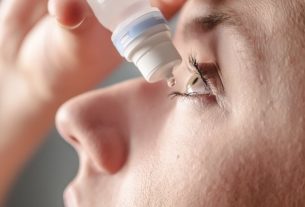Syphilis during pregnancy can harm the baby due to the risk of transmitting the infection to the child through the placenta, which can cause serious health problems such as hearing loss, visual impairment, neurological and bone problems.
The identification of syphilis during pregnancy can initially be done through symptoms such as sores in the genital region or red spots on the body, however, to confirm the diagnosis, blood tests such as VDRL or FTA-Abs are generally indicated.
If syphilis is suspected during pregnancy, it is important to consult an obstetrician for an evaluation and to initiate appropriate treatment, which usually involves an injection of penicillin. Through adequate treatment, it is possible to prevent the transmission of syphilis to the baby.

Symptoms of syphilis in pregnancy
Symptoms of syphilis in pregnancy are:
- Wound in the genital region, which may disappear in 3 to 6 weeks, even without treatment;
- Red spots on the skin;
- Hair loss;
- Wart-like plaques in the intimate area.
In some cases, there may also be skin peeling, headache, muscle pain, sore throat and malaise. Know how to recognize the symptoms of syphilis.
To confirm the diagnosis of syphilis during pregnancy, blood tests such as VDRL or FTA-Abs may be indicated, which can identify antibodies in the blood against bacteria that cause syphilis. See what the VDRL exam is and how to understand the result.
Online symptom test
To find out the chances of having syphilis, please select the symptoms you present:
This test is only a guidance tool and is not intended to provide a diagnosis or replace consultation with a urologist, gynecologist or infectious disease specialist.
Main risks for the baby
The main risks of syphilis for the baby are:
- Part premature;
- Fetal death;
- Low weight at birth;
- Spots on the skin;
- Changes in bones;
- Fissure near the mouth;
- Nephrotic syndrome;
- Edema;
- Seizures;
- Meningitis;
- Deformation of the nose, teeth, jaw, roof of the mouth;
- Deafness;
- Learning difficulty.
Syphilis during pregnancy is serious especially if the infection is in the early stages, when it is more transmissible, although contamination can occur at any stage of pregnancy. The baby can also be infected during normal birth if there is a syphilis sore in the vaginal area.
Most infected babies do not show any symptoms at birth and, therefore, it may be advisable to perform the VDRL test regularly after birth and start treatment as soon as the disease is discovered.
How the treatment is carried out
Treatment for syphilis during pregnancy is recommended by the obstetrician and is normally done with penicillin injections in 1 or 3 doses, depending on the severity and time of contamination:
- Recent primary, secondary or latent syphilis (up to one year old) during pregnancy: 1 single dose of penicillin;
- Late latent syphilis (with more than a year of evolution): 3 doses of penicillin, one per week;
- Latent syphilis with unknown duration: 3 doses of penicillin, one per week;
It is important to carry out the treatment until the end to avoid transmitting syphilis to the baby. Therefore, if the treatment is not complete, it is recommended to consult an obstetrician, who may recommend starting the treatment again.
In addition, it is also recommended to treat the partner and avoid unprotected sex during the treatment period to prevent the woman from becoming infected again and putting the baby at risk.
After the baby is born, it is important to consult a pediatrician for an evaluation and, if necessary, treatment with penicillin may also be indicated for the baby. See how syphilis is treated in babies.
Side effects of treatment in pregnant women
With treatment with Penicillin, pregnant women may experience some side effects such as contractions, fever, headache, muscle or joint pain, chills and diarrhea, and it is important to inform the doctor if they occur.
To reduce fever and headaches, pregnant women can place a compress with cold water on their forehead. In case of muscle and joint pain, one option is to take a hot bath or receive a relaxing massage. Additionally, paracetamol can also help alleviate these side effects, but it should be used with caution.
In case of diarrhea, a good tip is to increase your yakult intake, as this yogurt contains live lactobacilli that help regulate the intestine, as well as drinking plenty of water to compensate for water losses and hydrate the body.
Pregnant woman allergic to penicillin
The treatment of syphilis for pregnant women allergic to penicillin can be done with other antibiotics such as ceftriaxone, for example, however, there are currently no antibiotics other than penicillin that guarantee treatment for both mother and baby.
Therefore, it is important to consult an obstetrician if you suspect an allergy to penicillin for an evaluation. Sometimes allergy treatment may be indicated.
Signs of improvement and worsening
Signs of improvement in syphilis during pregnancy include the reduction or disappearance of wounds in the intimate region, as well as lesions on the skin and mouth, if any, and a reduction in swelling and pain in the mouth.
Signs of worsening syphilis during pregnancy include an increase in sores in the intimate area, the appearance or increase of lesions on the skin and mouth, increased swelling, fever, muscle stiffness and paralysis of the limbs.
Complications of syphilis in pregnancy
Complications of syphilis during pregnancy are more common in pregnant women who do not undergo treatment correctly. In this case, the risk of transmitting syphilis to the baby through the placenta or birth canal is greater and the baby may develop congenital syphilis.
Another serious complication of syphilis for women is neurosyphilis in which the brain and spinal cord are infected and can cause damage to the nervous system such as paralysis or blindness.
Find out more about the disease in the following video:

Sign up for our newsletter and stay up to date with exclusive news
that can transform your routine!
Warning: Undefined array key "title" in /home/storelat/public_html/wp-content/plugins/link-whisper-premium/templates/frontend/related-posts.php on line 12
Warning: Undefined array key "title_tag" in /home/storelat/public_html/wp-content/plugins/link-whisper-premium/templates/frontend/related-posts.php on line 13



